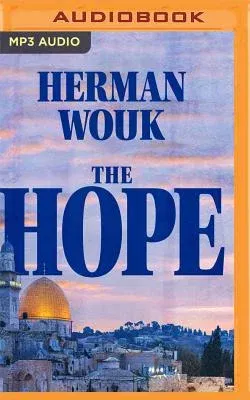Starting in 1948 and reaching its climax during the Six-Day War of 1967,
The Hope begins the story of Israel, a country fighting for its life -
outmatched and surrounded by enemies. Zev Barak, Sam Pasternak, Don
Kishote, and Benny Luria are all officers in the Israeli Army, caught up
in the sweep of history, fighting the desperate desert battles and
meeting the larger-than-life personalities that shaped Israel's fight
for independence. The four heroes, and the women they love - three
Israelis and one American - weave a compelling tapestry of individual
destinies through the grand social history of one nation's struggle
against the odds.
Their story - and Israel's - is concluded in The Glory, which picks up
from the Six-Day War and carries through to the hope for peace of the
Camp David accords. In this two-part epic, Pulitzer Prize-winning author
Herman Wouk brings out the passion, romance, and heroism of Israel's
struggle for survival - adding to his oeuvre yet another enthralling
saga that's impossible to put down.
About the Author: Herman Wouk is one of the most widely-read American
authors in the world. His books have been translated into 27 languages,
and many of his works have become best sellers. He is perhaps best known
for The Winds of War and War and Remembrance, an
exhaustively-researched two-part historical series telling the story of
World War II from the perspective of two fictional families whose lives
were irrevocably changed by the war and the Holocaust. Sixteen years in
the making, the epic involved extensive archival research including
travel for research to England, Germany, Italy, Poland, and Israel. The
Winds of War and War and Remembrance were adapted for television in a
30-hour series that won the 1989 Emmy Award for Outstanding Miniseries
and was, according to ABC, "the most watched television show in
history."
Born in New York City to Russian-Jewish parents, Wouk graduated from
Columbia University and started out working as a comedy writer for Fred
Allen's radio show. After the attack on Pearl Harbor in December 1941,
he joined the Navy, serving in eight Pacific invasions and earning
several battle stars. During his service in the Pacific he had turned to
writing, like Lieutenant Keefer in The Caine Mutiny, for an hour or
two before dawn. After his discharge in 1946, Wouk finished his first
novel, which became a Book-of-the-Month Club selection, and he soon
followed up with the international best sellers The Caine Mutiny, and
Marjorie Morningstar.
Wouk won the 1952 Pulitzer Prize for fiction for The Caine Mutiny. He
has also been awarded numerous academic honors, including a degree from
the Hebrew University in Jerusalem. In January 2001, UC San Diego
established the Herman Wouk Chair of Modern Jewish Studies, and in 2008
he was given the first Library of Congress Lifetime Achievement Award
for the Writing of Fiction.

